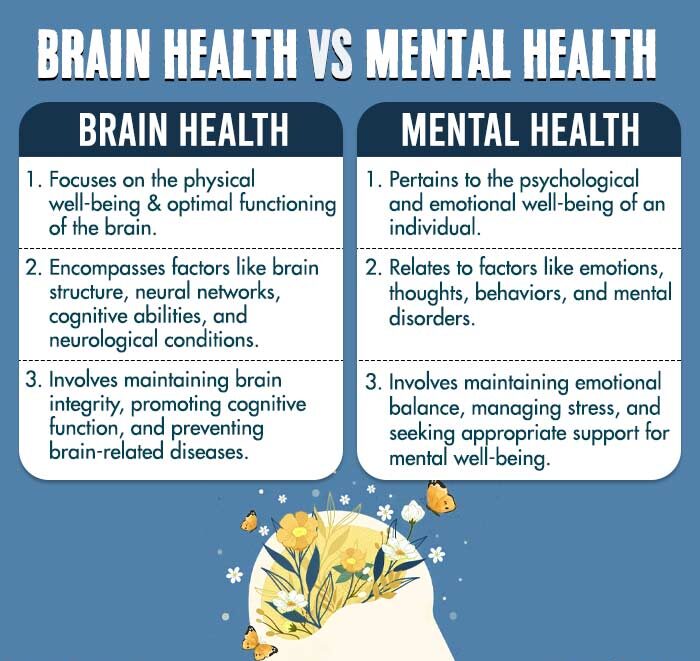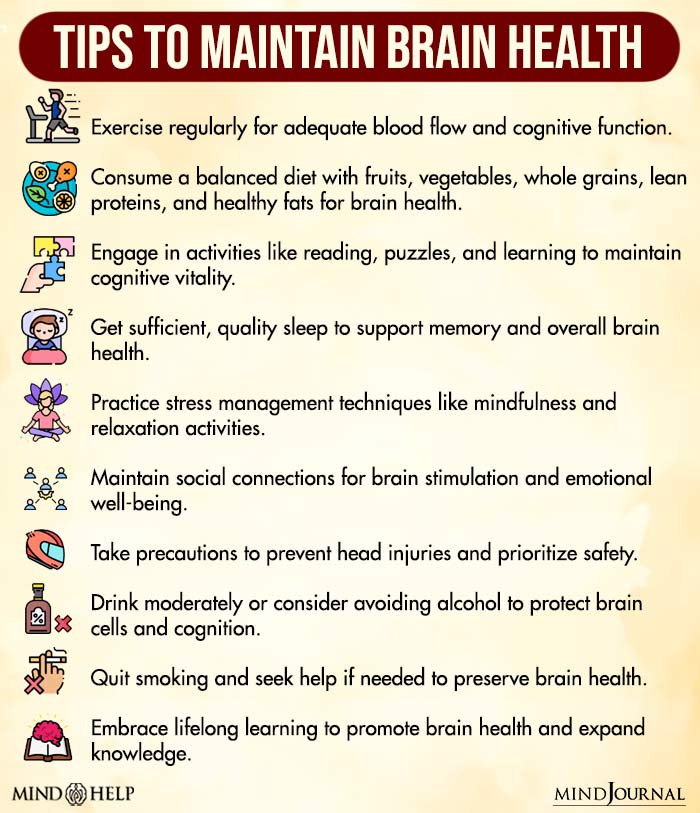Brain health encompasses the preservation of optimal brain integrity and the promotion of cognitive and mental function at any given age. It empowers us to enhance our psychological well-being, cognitive abilities, emotional regulation, and behavioral functioning. By prioritizing brain health, we can optimize our overall cognitive and emotional well-being, leading to a more fulfilling and productive life.
What Is Brain Health?
Brain health refers to the overall state of well-being and optimal functioning of the brain. It encompasses various aspects, including cognitive abilities, emotional well-being, mental health functioning, and the ability to effectively manage daily activities.
A healthy brain is characterized by sharp cognitive skills, good memory, efficient information processing, emotional resilience, and the absence of neurological disorders or impairments. Examples of brain health can be seen in individuals who possess the ability to think clearly, solve problems, and learn new information efficiently.
According to the World Health Organization (WHO), approximately 50 million people worldwide 1 Avan, A., Hachinski, V., & Brain Health Learn and Act Group (2022). Brain health: Key to health, productivity, and well-being. Alzheimer’s & dementia : the journal of the Alzheimer’s Association, 18(7), 1396–1407. https://doi.org/10.1002/alz.12478 suffer from dementia, with nearly 10 million new cases emerging each year.
These figures highlight the importance of preventing cognitive decline and promoting brain health across all age groups.
Read More About How To Improve Brain Health Here
The Importance Of Brain Health
Brain health is crucial for various reasons. A healthy brain ensures optimal cognitive function, including memory, attention, problem-solving, and decision-making abilities, enabling effective daily functioning. It also plays a key role in regulating emotions, contributing to mental well-being, stress management, and emotional resilience, thus enhancing the overall quality of life.
Prioritizing brain health can help reduce the risk of neurological disorders and cognitive decline 2 Kelley, M., Ulin, B., & McGuire, L. C. (2018). Reducing the Risk of Alzheimer’s Disease and Maintaining Brain Health in an Aging Society. Public health reports (Washington, D.C. : 1974), 133(3), 225–229. https://doi.org/10.1177/0033354918763599 , such as dementia and Alzheimer’s disease, through lifestyle choices that promote neuroplasticity.
Furthermore, maintaining brain health supports longevity, a higher quality of life, cognitive enhancement, independence, and adequate engagement in activities. By taking care of our brain health, we can lead more fulfilling lives and reduce the risk of cognitive impairment and neurological conditions.
Read More About Dementia Here
Signs Of A Healthy Brain
Common 3 Maldonado, K. A., & Alsayouri, K. (2020). Physiology, Brain. PubMed; StatPearls Publishing. Available from: https://www.ncbi.nlm.nih.gov/books/NBK551718/ signs of a healthy brain include:
- Sharp cognitive abilities and good memory
- Efficient information processing and quick decision-making
- Emotional balance and stress management
- Clear thinking and effective communication
- Adaptability to new situations
- Healthy sleep patterns
- Engaging in regular exercise, a balanced diet, and intellectual stimulation
- Positive mood and mental well-being
- Sustained attention and concentration
- Absence of neurological and memory disorders
What Causes An Unhealthy Brain?
Common causes 4 Gorelick, P. B., Furie, K. L., Iadecola, C., Smith, E. E., Waddy, S. P., Lloyd-Jones, D. M., Bae, H. J., Bauman, M. A., Dichgans, M., Duncan, P. W., Girgus, M., Howard, V. J., Lazar, R. M., Seshadri, S., Testai, F. D., van Gaal, S., Yaffe, K., Wasiak, H., Zerna, C., & American Heart Association/American Stroke Association (2017). Defining Optimal Brain Health in Adults: A Presidential Advisory From the American Heart Association/American Stroke Association. Stroke, 48(10), e284–e303. https://doi.org/10.1161/STR.0000000000000148 of an unhealthy brain include:
- Chronic stress and anxiety
- Lack of physical exercise and a sedentary lifestyle
- Unhealthy diet high in processed foods and sugar
- Substance abuse, including alcohol and drug addiction
- Sleep deprivation and poor sleep quality
- Chronic health conditions (such as hypertension, diabetes, and obesity)
- Neurological disorders (such as Alzheimer’s disease, Parkinson’s disease, or multiple sclerosis)
- Traumatic brain injury or head trauma
- Exposure to toxins, pollutants, or environmental hazards
- Excessive technology use
- Genetic predisposition to certain brain disorders
- Lack of intellectual stimulation and cognitive engagement
- Social isolation and lack of social support
Brain Health And Mental Health
Brain health and mental health are intricately related 5 NCBI. (2012). Information about Mental Illness and the Brain. Nih.gov; National Institutes of Health (US). Available from: https://www.ncbi.nlm.nih.gov/books/NBK20369/ , with poor brain health having profound implications for daily mental health functioning and overall well-being. One of the key effects is cognitive decline, which manifests as difficulties with memory, attention, problem-solving, and decision-making.
This decline can disrupt daily tasks, hinder work performance, and diminish overall productivity. Additionally, poor brain health is closely linked to emotional and mental health issues, such as depression, anxiety, and mood swings, leading to emotional instability, impaired stress management, and a reduced sense of well-being.
The consequences of an unhealthy brain extend beyond cognitive and emotional aspects. It significantly diminishes the quality of life, impacting relationships, social interactions, and the ability to engage in activities once enjoyed. Feelings of frustration, decreased independence, and a loss of overall satisfaction in life may arise.
Moreover, impaired brain health affects physical functioning, including balance, coordination, motor skills, and overall physical performance.
Long-term poor brain health increases the risk of developing neurological disorders like Alzheimer’s disease, Parkinson’s disease, or dementia. These conditions significantly disrupt daily life and overall functioning.
Strained relationships can also result from cognitive decline and emotional instability, as communication difficulties, mood swings, and memory problems strain interpersonal dynamics and social interactions.
Furthermore, poor brain health poses financial and practical challenges, making it difficult to manage finances, organize daily tasks, and make sound decisions, thereby necessitating increased reliance on external support.
Read More About Alzheimer’s Disease Here

How Lifestyle, Brain Health And Mental Health Are Connected
Lifestyle and mental health are closely connected 6 Ekstrand, B., Scheers, N., Rasmussen, M. K., Young, J. F., Ross, A. B., & Landberg, R. (2021). Brain foods – the role of diet in brain performance and health. Nutrition reviews, 79(6), 693–708. https://doi.org/10.1093/nutrit/nuaa091 to brain health.
A healthy lifestyle, including regular exercise, a balanced diet, and intellectual stimulation, positively impacts brain health and mental health. Exercise releases endorphins, improving mood and reducing stress.
A nutritious diet provides essential nutrients for brain function, while intellectual stimulation maintains cognitive vitality. Good mental health, achieved through stress management and seeking support, also influences brain health positively.
Conversely, unhealthy lifestyle choices and poor mental health have detrimental effects on the brain. Sedentary behavior, a diet high in processed foods, and substance abuse contribute to inflammation and impaired brain function.
Mental health conditions like chronic stress and depression affect neuroplasticity and cognitive function, increasing the risk of neurodegenerative diseases. Unhealthy coping mechanisms, such as excessive alcohol or drug use, further compromise brain health. Taking steps towards a healthy lifestyle and addressing mental health positively impact brain health and overall well-being.
Tips For Brain Health
Experts recommend the 6 pillars of brain health or measures that encompass various lifestyle factors 7 Mintzer, J., Donovan, K. A., Kindy, A. Z., Lock, S. L., Chura, L. R., & Barracca, N. (2019). Lifestyle Choices and Brain Health. Frontiers in medicine, 6, 204. https://doi.org/10.3389/fmed.2019.00204 aimed at maintaining optimal brain health, better cognitive functioning, as well as great emotional well-being and quality of life. To keep your brain healthy, you must:
- Engage in regular physical activity
- Maintain a nutritious diet
- Challenge your mind with stimulating activities
- Get quality sleep
- Manage stress effectively
- Stay socially active
- Protect your brain from injuries
- Limit alcohol consumption
- Avoid smoking and substance abuse
- Embrace lifelong learning

Takeaway
The importance of brain health dictates the ability to lead a healthy life. Brain health plays a vital role in shaping our overall well-being and future outcomes. The quality of our decisions, which profoundly impacts our health, is directly linked to the health of our brain.
Therefore, it is crucial to understand and prioritize our brain health, taking necessary steps to enhance it. It is essential to steer clear of anything that could potentially harm the brain and actively engage in activities that promote its well-being. By valuing and nurturing our brain health, we set the foundation for a fulfilling and healthy life.
At A Glance
- Brain health encompasses the preservation of optimal brain integrity and cognitive function, tailored to individual age and developmental stages.
- It empowers us to enhance our psychological, cognitive, emotional, and behavioral capacities.
- The focus of brain health is on mitigating risk factors, maintaining active memory functioning, and maximizing brain potential as we age.
- Brain health conditions can manifest at any point in our lifespan, characterized by disruptions in typical brain development or functioning.
Frequently Asked Questions (FAQs)
1. What are brain health exercises?
Brain health exercises refer to activities or mental tasks that are designed to stimulate and promote cognitive function and overall brain health.
2. What are the best games for brain health?
The best games for brain health may vary depending on individual preferences, but popular choices include puzzles, memory games, crosswords, Sudoku, and brain training apps.
3. What foods are good for brain health?
Foods that are good for brain health include fatty fish like salmon, blueberries, turmeric, broccoli, pumpkin seeds, dark chocolate, and green tea, among others.















